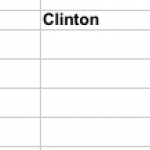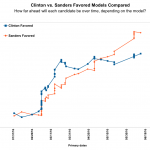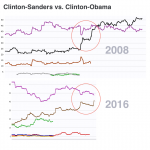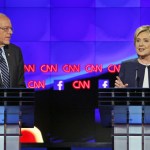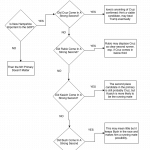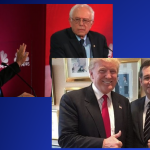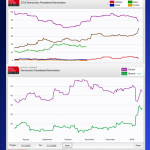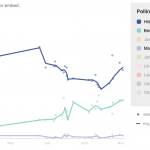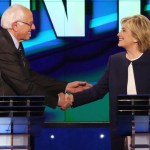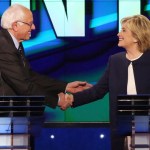clinton
This weekend there are Democratic Party primaries or caucuses in Kansas, Louisiana, Nebraska, Maine and Puerto Rico. The model I developed for predicting primary and caucus outcomes indicates the following results as most likely:
Sanders is losing the primaries, so far, and Clinton is on the path to victory. However, Sanders has a fair amount of time to catch up. Perhaps he just needs his strategy to take hold. The idea was to have a revolution, which in this case, means a lot of people show up. A lot of people did show up, but not enough. Sanders needs to get the rest of them to show up…
You may be asking yourself the same question, especially if, like me, you vote on Tuesday, March 1st.
For some of us, a related question is which of the two is likely to win the nomination.
If one of the two is highly likely to win the nomination, then it may be smart to vote for that candidate in order to add to the momentum effect and, frankly, to end the internecine fighting and eating of young within the party sooner. If, however, one of the two is only somewhat likely to win the nomination, and your preference is for the one slightly more likely to lose, then you better vote for the…
I recently developed a model of how the primary race will play out between Democratic presidential hopefuls Hillary Clinton and Bernie Sanders.
That model made certain assumptions, and allowed me to produce two projections (well, many, but I picked two) depending on how each candidate actually fairs with different ethnic groups (White, Back, Hispanic, since those are the groupings typically used).
The two different versions of this model were designed to favor each candidate differently. The Clinton-favored model started with the basic assumption that among white Democratic Party voters,…
It is far too early to predict the outcome of the Democratic Party primary. Personally, I like both of the candidates and will support whichever one is selected to run in the general election. Both candidates have strong reasons to vote for them, and each candidate has their own “electability” issues. I vote on March 1st, and have not yet decided whom to vote for.
Why would I start out an essay, an essay that is meant to be an objective analysis, with that statement? Because the validity of a statement, opinion, or analysis of the current primary process is inevitably evaluated in terms of…
I'm looking at an exit poll by NBC and I have thoughts.
Gender Gap
Much has been made of the fact that Sanders got 55% of female votes, more than 44% for Clinton. That is indeed significant. But little has been said about the fact that among males, 66% voted for Sanders and 32% for Clinton. (55% of the Democratic Primary voters were female, 45% male.)
Race/Ethnicity
93% of the Democratic Primary voters were white, 2% black, and the numbers are so small that almost nothing can be said about this important distinction among voters. This is unfortunate because this will impact several…
At about 9 PM eastern, with 90% of the votes counted in the Democratic primary, Sanders is showing a strong win. He is currently at about 60%, while Clinton is at 38%. That gap is significantly larger than what I had intuitively established at the cutoff for a Sanders "lower than expectation loss." So, congratulations Bernie Sanders! If those numbers hold, that is a decisive win.
(A lot of Sanders supporters were crowing about a 20% lead in the polls, which seemed kind of extreme at the time. They may end up being proven right!)
In the Republican primary, with about 90% reporting, Donald…
I wrote about what I thought might happen in the New Hampshire primary a few days ago, but enough new stuff has happened to make it worth revisiting.
Who will win the New Hampshire GOP Primary?
And, perhaps more important, who will come in second, third, and fourth?
We know that Donald Trump will win the New Hampshire primary. Polls show him up far above the other candidates, he has been on a modest upward trend since the beginning of the year, and the most recent polls show an abrupt upward swing. He now stands at about 17% above the second place candidates.
New Hampshire seems to like…
I watched the debate pretty closely, and in my opinion, both candidates did pretty well and it was mostly an even contest. (Note: I am not committed to one or the other candidate, I happen to like them both.)
Sanders did very well in getting his message across, but he demonstrated weakness in foreign policy.
Clinton did a good job at addressing the alleged Wall Street ties and addressing the email issue.
But there is another way to answer the question. How much did each candidate strengthen their own support, and how much did each candidate do to convince undecided individuals to prefer…
SEE THIS UPDATE
ADDED: Following the GOP primary, there has been another development. In most recent polls, Trump is clearly ahead in New Hampshire, with Marco Rubio a moderately strong second or third. In various polls he is second in most polls (by a few points) and tied in one. Kasich is generally right behind Rubio, with Cruz in third place in a few polls.
Rubio crashed and burned in last night's debate, according to most observers. And he really did. So, this may be reflected in New Hamsphire with Rubio moving down quite a bit. He crashed in part because Christie skillfully skewered…
Was the Iowa Caucus outcome determined by a coin flip?
We have seen several reports that Hillary Clinton won the Iowa Caucus by a coin toss, or by six coin tosses. Or some other number. We've also seen reports that six delegates were awarded to Clinton on the basis of coin tosses, implying that of the 44 delegates determined on Monday in Iowa a large percentage were chosen by the toss of an unfair coin, that somehow the Clinton campaign controlled the coin tosses causing them to all come out in her favor. And so on.
After a barrage of these reports, we are now seeing a small number of reports…
Increasingly, I feel the need to declare my position on the candidates before commenting on the process, because, increasingly, the conversation has become one of comparative litmus tests. So, here's the deal on that: I like Clinton and Sanders both, and I like each of them for both overlapping and different reasons. As a life long Democrat I'm glad to see such good candidates running. I will decide whom to support in the Minnesota Caucus some time after I walk into the building, most likely. Then, later, I will decide which candidate, if any, I might work for during the time between our…
The answer: One Republican and One Democrat/Independent.
The Iowa Caucus is pretty much up for grabs in both parties. Over recent days, a clear Trump lead has been erased, and Cruz is now ahead in recent polls. Over roughly the same period, a clear Clinton lead has been erased, and Sanders is now ahead in recent polls.
FiveThirtyEight (Nate Silver) is still predicting a Clinton victory for the Dems, but a Cruz victory for the GOPs. The Clinton victory prediction is of high confidence, while the Cruz prediction is not, and Trump is close behind.
One way to look at the polls is to track…
I have studiously avoided picking a Democratic candidate to support. I will not have to decide until Super Tuesday, when Minnesotans caucus to support one or another candidate. I like Hillary Clinton for a number of reasons, including the simple fact that she has considerable experience in the Executive branch, and is a person who can get things done. If I got to pick the president (skipping the election process entirely), I'd probably pick Sanders because I'm all in on the revolution in American policy. Both candidates are actually in close agreement on most of the key issues. Neither…
I'm going to make this simple. The primary season has not started yet. It starts in a few weeks. Everything we are doing now is pre-Primary. Not one person has put pen to checkmark in a voting booth.
Once that process starts, everything changes. Suddenly there is more polling in downstream states. Starting before the first primaries, but then ramping up as we head towards states that matter (and no, Iowa and New Hampshire don't matter despite what you may have been told). Same with campaigning. We've seen a few debates, there's been a lot of speeches, but you ain't seen nothing yet. And…
The current polling as shown on the Huffpo Pollster, using only "likely voters" and "non partisan polls" shows that Trump and Carson are neck and neck and have been close for a week. Most of the other candidates are so low it is impossible to imagine any of them rising to a level of significance. On the other hand, there are still so many clowns in the clown car that it is hard to say. If eight or nine of the candidates dropped out over the next few weeks, it is possible that someone will rise up.
On the other hand, there is a thing about how the Republicans pick their candidate that may…
Clinton vs. Sanders, Likely Voters, Non-Partisan Polls only. Graphic last updated October 15th, shows polls through October 12th only.
Lincoln Chafee, Hillary Clinton, Martin O'Malley, Bernie Sanders, and Jim Webb faced off in the Facebook-CNN sponsored debate. Who won?
The individual who "won" is the individual whose poll numbers went up the most, and we don't know that yet. But there are other ways to win, and other ways to talk about winning.
Winners
Barack Obama I am pleased to note that the candidates running for the Democratic nomination were not running away from the President. That proved to be a bad strategy for House and Senate Democrats during the last election, and we are not seeing it today. One of the…
David Appell's recent post is excellent, so I'll steal most of it, a quote from Hillary Clinton in January:
During his visit to China in November, President Obama held a town hall meeting with an online component to highlight the importance of the internet. In response to a question that was sent in over the internet, he defended the right of people to freely access information, and said that the more freely information flows, the stronger societies become. He spoke about how access to information helps citizens to hold their governments accountable, generates new ideas, and encourages…
Dr John Hope Franklin was a 1935 A.B. graduate of Fisk University in Nashville, TN, then earned his M.A. (1936) and Ph.D. (1939) from Harvard University. [For reference, W.E.B. DuBois also graduated from Fisk (1888) and was the first Black to earn a Ph.D. from Harvard (1895).] Franklin's doctoral dissertation, The Free Negro in North Carolina, 1790-1860, planted the seed for his classic 1947 work, From Slavery to Freedom: A History of Negro Americans (subtitle later changed to "A History of African-Americans"). This book, now in its eighth edition, was written originally during his four-…
tags: presidential primaries, racism, Hillary Clinton, Barack Obama, Democratic primaries
Image: NYTimes.
It isn't news any longer that Barack Obama has apparently won enough electoral votes to be nominated as this nation's democratic candidate for the presidency. However, what is news is the fact that a fair percentage of Hillary's supporters are, by their own assertions, a bunch of whiney, bigoted pigs because they claim they will either vote for Rethuglican John McCain instead of fellow Democrat, Barack Obama, or they will refuse to vote at all. So, while a lot of people are overjoyed…
